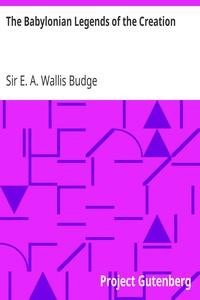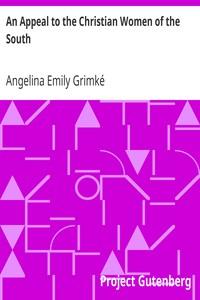Read this ebook for free! No credit card needed, absolutely nothing to pay.
Words: 16889 in 18 pages
This is an ebook sharing website. You can read the uploaded ebooks for free here. No credit cards needed, nothing to pay. If you want to own a digital copy of the ebook, or want to read offline with your favorite ebook-reader, then you can choose to buy and download the ebook.


: The Babylonian Legends of the Creation by Budge E A Wallis Ernest Alfred Wallis Sir - Cosmogony Babylonian; Assyro-Babylonian literature Mythology
In the beginning nothing whatever existed except APS?, which may be described as a boundless, confused and disordered mass of watery matter; how it came into being is unknown. Out of this mass there were evolved two orders of beings, namely, demons and gods. The demons had hideous forms, even as Berosus said, which were part animal, part bird, part reptile and part human. The gods had wholly human forms, and they represented the three layers of the comprehensible world, that is to say, heaven or the sky, the atmosphere, and the underworld. The atmosphere and the underworld together formed the earth as opposed to the sky or heaven. The texts say that the first two gods to be created were LAKHMU and LAKHAMU. Their attributes cannot at present be described, but they seem to represent two forms of primitive matter. They appear to have had no existence in popular religion, and it has been thought that they may be described as theological conceptions containing the notions of matter and some of its attributes.
After countless aeons had passed the gods ANSHAR and KISHAR came into being; the former represents the "hosts of heaven," and the latter the "hosts of earth."
After another long and indefinite period the independent gods of the Babylonian pantheon came into being, e.g., ANU, EA, who is here called NUDIMMUD, and others.
In the consultation which took place between APS? and TI?MAT, their messenger MU-UM-MU took part; of the history and attributes of this last-named god nothing is known. The result of the consultation was that a long struggle began between the demons and the gods, and it is clear that the object of the powers of darkness was to destroy the light. The whole story of this struggle is the subject of the Seven Tablets of Creation. The gods are deifications of the sun, moon, planets and other stars, and APS?, or CHAOS, and his companions the demons, are personifications of darkness, night and evil. The story of the fight between them is nothing more nor less than a picturesque allegory of natural phenomena. Similar descriptions are found in the literatures of other primitive nations, and the story of the great fight between Her-ur, the great god of heaven, and Set, the great captain of the hosts of darkness, may be quoted as an example. Set regarded the "order" which Her-ur was bringing into the universe with the same dislike as that with which APS? contemplated the beneficent work of Sin, the Moon-god, Shamash, the Sun-god, and their brother gods. And the hostility of Set and his allies to the gods, like that of Ti?mat and her allies, was everlasting.
At this point a new Text fills a break in the First Tablet, and describes the fight which took place between Nudimmud or Ea, and Aps? and his envoy Mummu. Ea went forth to fight the powers of darkness and he conquered Aps? and Mummu. The victory over Aps?, i.e., the confused and boundless mass of primeval water, represents the setting of impassable boundaries to the waters that are on and under the earth, i.e., the formation of the Ocean. The exact details of the conquest cannot be given, but we know that Ea was the possessor of the "pure incantation" and that he overcame Aps? and his envoy by the utterance of a powerful spell. In the Egyptian Legend of Ra and Aapep, the monster is rendered spell-bound by the god Her-Tuati, who plays in it exactly the same part as Ea in the Babylonian Legend.
When Ti?mat heard of Ea's victory over Aps? and Mummu she was filled with fury, and determined to avenge the death of Aps?, her husband.
The first act of TI?MAT after the death of Aps? was to increase the number of her allies. We know that a certain creature called "UMMU-KHUBUR" at once spawned a brood of devilish monsters to help her in her fight against the gods. Nothing is known of the origin or attributes of UMMU-KHUBUR, but some think she was a form of TI?MAT. Her brood probably consisted of personifications of mist, fog, cloud, storm, whirlwinds and the blighting and destroying powers which primitive man associated with the desert. An exact parallel of this brood of devils is found in Egyptian mythology where the allies of Set and Aapep are called "Mesu betshet" i.e., "spawn of impotent revolt." They are depicted in the form of serpents, and some of them became the "Nine Worms of Amenti" that are mentioned in the Book of the Dead .
Not content with Ummu-Khubur's brood of devils, Ti?mat called the stars and powers of the air to her aid, for she "set up" the Viper, the Snake, the god Lakhamu, the Whirlwind, the ravening Dog, the Scorpion-man, the mighty Storm-wind, the Fish-man, and the Horned Beast. These bore the "merciless, invincible weapon," and were under the command of Kingu, whom Ti?mat calls "her husband." Thus Ti?mat had Eleven mighty Helpers besides the devils spawned by Ummu-Khubur. We may note in passing that some of the above-mentioned Helpers appear among the Twelve Signs of the Zodiac which Marduk "set up" after his conquest of Ti?mat, e.g., the Scorpion-man, the Horned Beast, etc. This fact suggests that the first Zodiac was "set up" by Ti?mat, who with her Eleven Helpers formed the Twelve Signs; the association of evil with certain stars may date from that period. That the Babylonians regarded the primitive gods as powers of evil is clear from the fact that Lakhamu, one of them, is enumerated among the allies of Ti?mat.
The helpers of Ti?mat were placed by her under the command of a god called KINGU who is TAMMUZ. He was the counterpart, or equivalent, of ANU, the Sky-god, in the kingdom of darkness, for it is said in the text "Kingu was exalted and received the power of Anu," i.e., he possessed the same power and attributes as Anu. When Ti?mat appointed Kingu to be her captain, she recited over him a certain spell or incantation, and then she gave him the TABLET OF DESTINIES and fastened it to his breast, saying, "Whatsoever goeth forth from thy mouth shall be established." Armed with all the magical powers conferred upon him by this Tablet, and heartened by all the laudatory epithets which his wife Ti?mat heaped upon him, Kingu went forth at the head of his devils.
When Ea heard that Ti?mat had collected her forces and Was determined to continue the fight against the gods which Aps? and Mummu had begun, and that she had made her husband Kingu her champion, he was "afflicted" and "sat in sorrow." He felt unable to renew the fight against the powers of darkness, and he therefore went and reported the new happenings to Anshar, representative of the "host of heaven," and took counsel with him. When Anshar heard the matter he was greatly disturbed in mind and bit his lips, for he saw that the real difficulty was to find a worthy antagonist for Kingu and Ti?mat. A gap in the text here prevents us from knowing exactly what Anshar said and did, but the context suggests that he summoned Anu, the Sky-god, to his assistance. Then, having given him certain instructions, he sent him on an embassy to Ti?mat with the view of conciliating her. When Anu reached the place where she was he found her in a very wrathful state, and she was muttering angrily; Anu was so appalled at the sight of her that he turned and fled. It is impossible at present to explain this interlude, or to find any parallel to it in other ancient Oriental literature.
When Anu reported his inability to deal with Ti?mat, a council of the gods was called, and Ea induced his son, Marduk to be present. We next find Anshar in converse with the god Marduk, who offers to act as the champion of the gods and to fight Ti?mat and her allies. Marduk being a form of the Sun-god, the greatest of all the powers of light, thus becomes naturally the protagonist of the gods, and the adversary of Ti?mat and her powers of darkness. Then Anshar summoned a great council of the gods, who forthwith met in a place called "Upshukkinaku", which may be described as the Babylonian Olympus. It was all-important for Marduk to appear at the council of the gods before he undertook his task, because it was necessary for him to be formally recognised by them as their champion, and he needed to be endowed by them with magical powers. The primitive gods Lakhmu and Lakhamu, and the Igigi, who may be regarded as star-gods, were also summoned. A banquet was prepared, and the gods attended, and having met and kissed each other they sat down, and ate bread and drank hot and sweet sesame wine. The fumes of the wine confused their senses, but they continued to drink, and at length "their spirits were exalted." They appointed Marduk to be their champion officially, and then they proceeded to invest him with the power that would cause every command he spake to be followed immediately by the effect which he intended it to produce. Next Marduk, with the view of testing the new power which had been given him, commanded a garment to disappear and it did so; and when he commanded it to reappear it did so.
Then returning to the dead body of Ti?mat he smashed her skull with his club and scattered her blood to the north wind, and as a reward for his destruction of their terrible foe, he received gifts and presents from the gods his fathers.
Free books android app tbrJar TBR JAR Read Free books online gutenberg
More posts by @FreeBooks

: The Raid from Beausejour; and How the Carter Boys Lifted the Mortgage Two Stories of Acadie by Roberts Charles G D Sir - Canadian fiction 19th century








